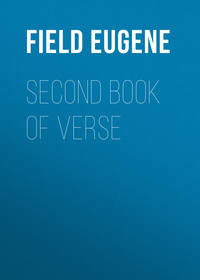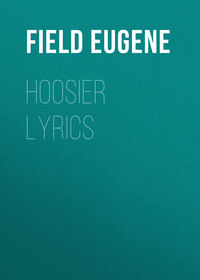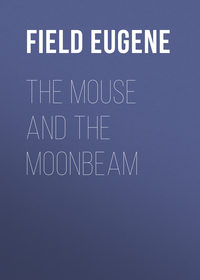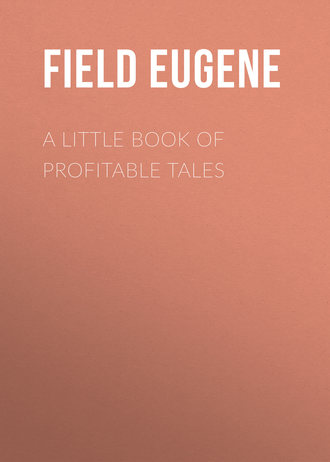 полная версия
полная версияA Little Book of Profitable Tales
The elf prince sat beside the fairy queen. The other elves capered around among the fairies. The dancing sward was very light, for a thousand and ten glowworms came from the marsh and hung their beautiful lamps over the spot where the little folk were assembled. If the moon and the stars were jealous of that soft, mellow light, they had good reason to be.
The fairies and elves circled around in lively fashion. Their favorite dance was the ring-round-a-rosy which many children nowadays dance. But they had other measures, too, and they danced them very prettily.
"I wish," said the old poet, "I wish that I had my violin here, for then I would make merry music for you."
The fairy queen laughed. "We have music of our own," she said, "and it is much more beautiful than even you, dear old poet, could make."
Then, at the queen's command, each gentleman elf offered his arm to a lady fairy, and each gentleman fairy offered his arm to a lady elf, and so, all being provided with partners, these little people took their places for a waltz. The fairy queen and the elf prince were the only ones that did not dance; they sat side by side on the violet leaf and watched the others. The hoptoad was floor manager; the green burdock badge on his breast showed that.
"Mind where you go – don't jostle each other," cried the hoptoad, for he was an exceedingly methodical fellow, despite his habit of jumping at conclusions.
Then, when all was ready, the Seven Crickets went "chirp-chirp, chirp-chirp, chirp-chirp," three times, and away flew that host of little fairies and little elves in the daintiest waltz imaginable: —

The old poet was delighted. Never before had he seen such a sight; never before had he heard so sweet music. Round and round whirled the sprite dancers; the thousand and ten glowworms caught the rhythm of the music that floated up to them, and they swung their lamps to and fro in time with the fairy waltz. The plumes in the hats of the cunning little ladies nodded hither and thither, and the tiny swords of the cunning little gentlemen bobbed this way and that as the throng of dancers swept now here, now there. With one tiny foot, upon which she wore a lovely shoe made of a tanned flea's hide, the fairy queen beat time, yet she heard every word which the gallant elf prince said. So, with the fairy queen blushing, the mellow lamps swaying, the elf prince wooing, and the throng of little folk dancing hither and thither, the fairy music went on and on: —


"Tell me, my fairy queen," cried the old poet, "whence comes this fairy music which I hear? The Seven Crickets in the hedge are still, the birds sleep in their nests, the brook dreams of the mountain home it stole away from yester morning. Tell me, therefore, whence comes this wondrous fairy music, and show me the strange musicians that make it."
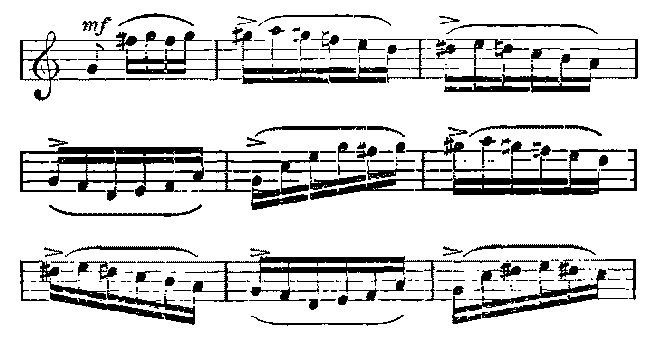

"Look to the grass and the flowers," said the fairy queen. "In every blade and in every bud lie hidden notes of fairy music. Each violet and daisy and buttercup, – every modest wild-flower (no matter how hidden) gives glad response to the tinkle of fairy feet. Dancing daintily over this quiet sward where flowers dot the green, my little people strike here and there and everywhere the keys which give forth the harmonies you hear."
Long marvelled the old poet. He forgot his sorrow, for the fairy music stole into his heart and soothed the wound there. The fairy host swept round and round, and the fairy music went on and on.
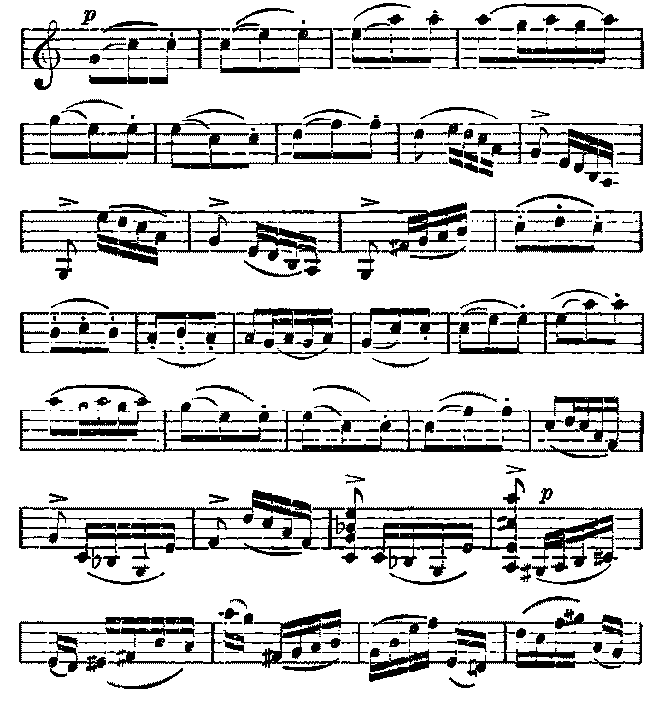
"Why may I not dance?" asked a piping voice. "Please, dear queen, may I not dance, too?"
It was the little hunchback that spake, – the little hunchback fairy who, with wistful eyes, had been watching the merry throng whirl round and round.
"Dear child, thou canst not dance," said the fairy queen, tenderly; "thy little limbs are weak. Come, sit thou at my feet, and let me smooth thy fair curls and stroke thy pale cheeks."
"Believe me, dear queen," persisted the little hunchback, "I can dance, and quite prettily, too. Many a time while the others made merry here I have stolen away by myself to the brookside and danced alone in the moonlight, – alone with my shadow. The violets are thickest there. 'Let thy halting feet fall upon us, Little Sorrowful,' they whispered, 'and we shall make music for thee.' So there I danced, and the violets sang their songs for me. I could hear the others making merry far away, but I was merry, too; for I, too, danced, and there was none to laugh."
"If you would like it, Little Sorrowful," said the elf prince, "I will dance with you."
"No, brave prince," answered the little hunchback, "for that would weary you. My crutch is stout, and it has danced with me before. You will say that we dance very prettily, – my crutch and I, – and you will not laugh, I know."
Then the queen smiled sadly; she loved the little hunchback and she pitied her.
"It shall be as you wish," said the queen. The little hunchback was overjoyed.
"I have to catch the time, you see," said she, and she tapped her crutch and swung one little shrunken foot till her body fell into the rhythm of the waltz.
Far daintier than the others did the little hunchback dance; now one tiny foot and now the other tinkled on the flowers, and the point of the little crutch fell here and there like a tear. And as she danced, there crept into the fairy music a tenderer cadence, for (I know not why) the little hunchback danced ever on the violets, and their responses were full of the music of tears. There was a strange pathos in the little creature's grace; she did not weary of the dance: her cheeks flushed, and her eyes grew fuller, and there was a wondrous light in them. And as the little hunchback danced, the others forgot her limp and felt only the heart-cry in the little hunchback's merriment and in the music of the voiceful violets.
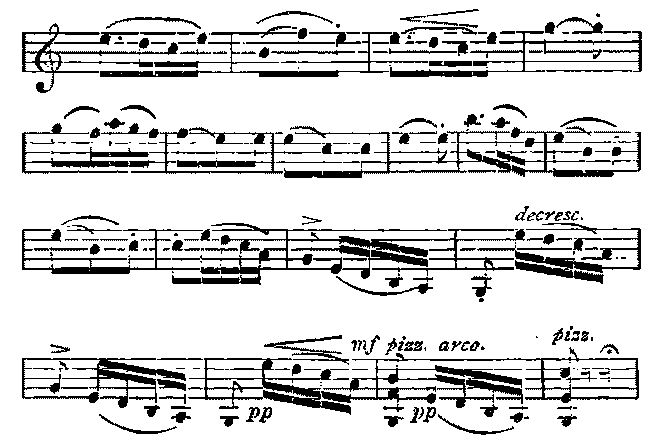
Now all this saw the old poet, and all this wondrously beautiful music he heard. And as he heard and saw these things, he thought of the pale face, the weary eyes, and the tired little body that slept forever now. He thought of the voice that had tried to be cheerful for his sake, of the thin, patient little hands that had loved to do his bidding, of the halting little feet that had hastened to his calling.
"Is it thy spirit, O my love?" he wailed. "Is it thy spirit, O dear, dead love?"
A mist came before his eyes, and his heart gave a great cry.
But the fairy dance went on and on. The others swept to and fro and round and round, but the little hunchback danced always on the violets, and through the other music there could be plainly heard, as it crept in and out, the mournful cadence of those tenderer flowers.
And, with the music and the dancing, the night faded into morning. And all at once the music ceased and the little folk could be seen no more. The birds came from their nests, the brook began to bestir himself, and the breath of the new-born day called upon all in that quiet valley to awaken.
So many years have passed since the old poet, sitting under the three lindens half a league the other side of Pesth, saw the fairies dance and heard the fairy music, – so many years have passed since then, that had the old poet not left us an echo of that fairy waltz there would be none now to believe the story I tell.

Who knows but that this very night the elves and the fairies will dance in the quiet valley; that Little Sorrowful will tinkle her maimed feet upon the singing violets, and that the little folk will illustrate in their revels, through which a tone of sadness steals, the comedy and pathos of our lives? Perhaps no one shall see, perhaps no one else ever did see, these fairy people dance their pretty dances; but we who have heard old Robert Volkmann's waltz know full well that he at least saw that strange sight and heard that wondrous music.
And you will know so, too, when you have read this true story and heard old Volkmann's claim to immortality.
1887.
THE END1
The music arranged by Mr. Theodore Thomas.


